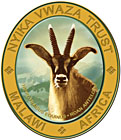Research
The Trust is keen to support research into conservation, environmental or socio-economic issues that affect the Nyika National Park and the Vwaza March Wildlife Reserve. In April and October each year the Trust publishes a call for applications from postgraduate students and other suitably qualified persons at universities or other higher education institutions to carry out research into important issues. The next calls will close on 31st January 2024 and 31st July 2024. Applications may be made by suitably qualified independent researchers not attached to any institution. These may be suggested by the Trust or topics identified by others which are subject to evaluation by the Trust. The grants are intended to provide financial assistance towards a project and will not normally be expected to cover all the project costs. Click here to find details of how to apply for a Research Grant.
The Trustees have identified the following principal ecological threats or research opportunities in the protected areas:
Invasive species
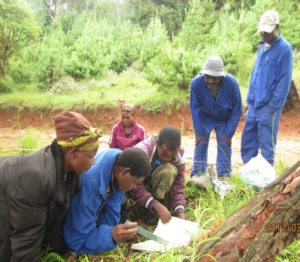 Some of the major issues on the Nyika concern invasive plants such as Rubus ellipticus, Pinus patula and the indigenous bracken fern taking over some of the grassland areas. Some research studies have recently been done on this, but what is still required is to find the determining factors in their spread and how these species might be controlled by management. These topics are elaborated upon in two Conservation Research Notes:
Some of the major issues on the Nyika concern invasive plants such as Rubus ellipticus, Pinus patula and the indigenous bracken fern taking over some of the grassland areas. Some research studies have recently been done on this, but what is still required is to find the determining factors in their spread and how these species might be controlled by management. These topics are elaborated upon in two Conservation Research Notes:
Conservation Research Note 2 – Bracken and
Conservation Research Note 7 – Extent and Impact of alien invasive species in Nyika National Park
Completed Research Projects funded by NVT
- A survey of alien plants on the Nyika Plateau 2016/7 Author: Andrew Kanzunguze
- Mapping and remote detection of Bracken Fern invasion on the Nyika Plateau (2017) Author: Andrew Kanzunguze
- Ecology of Bracken Fern invasion in Nyika National Park: Assessment of spatial temporal distribution and potential threat to plant species diversity (December 2019) Author: Andrew Kanzunguze
- Effects of pine removal on natural grassland regeneration: case of Chilinda Pine Plantation Author: Sopani Sichinga
Fire Management programme
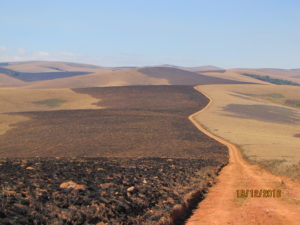 Hot fires cause considerable damage to the environment as they threaten the remaining montane forests and alter the composition of grass species from palatable grasses to coarser, less palatable species. Although controlled burns have been introduced in recent years to protect the remnant evergreen forest areas, lack of resources means that it may not be carried out consistently, leading to uncontrolled fires causing extensive damage. This is more particularly elaborated in the Conservation Research Note 3 – Fire Ecology
Hot fires cause considerable damage to the environment as they threaten the remaining montane forests and alter the composition of grass species from palatable grasses to coarser, less palatable species. Although controlled burns have been introduced in recent years to protect the remnant evergreen forest areas, lack of resources means that it may not be carried out consistently, leading to uncontrolled fires causing extensive damage. This is more particularly elaborated in the Conservation Research Note 3 – Fire Ecology
Completed Research Projects funded by NVT
- Measuring fire occurrence patterns and possible associations with the spread of bracken fern (Pteridium aquilinum) in Nyika National Park Author: Lumbani Benedicto Banda
Bird Studies
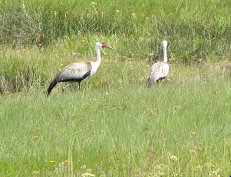 We are keen to encourage further studies of bird species believed to be threatened in order to understand more clearly their current conservation status and the possible threats to them. These include vultures, bustards, cranes and swallows. This topic is elaborated more in the Conservation Research Note 4 ‒ Birds
We are keen to encourage further studies of bird species believed to be threatened in order to understand more clearly their current conservation status and the possible threats to them. These include vultures, bustards, cranes and swallows. This topic is elaborated more in the Conservation Research Note 4 ‒ Birds
Completed Research Projects funded by NVT
- Vultures Ecosystem Services Report: the case study of Nyika National Park Author: Emmanouela Galanou
- Honeyguides, Honey-hunting and the current state of Human-Honeyguide mutualism in Northern Malawi Author: George Malembo M’manga
Law enforcement
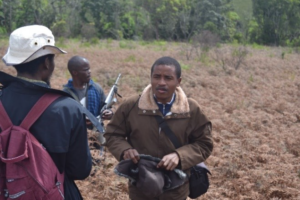 Park management is ill-equipped to control poaching for commercial gain of animal and plant species, in particular orchid species unique to the Nyika. The Trustees are keen to encourage the involvement of local communities in the protection of endangered species of plants and animals for conservation and for benefit to their communities. Please see:
Park management is ill-equipped to control poaching for commercial gain of animal and plant species, in particular orchid species unique to the Nyika. The Trustees are keen to encourage the involvement of local communities in the protection of endangered species of plants and animals for conservation and for benefit to their communities. Please see:
Conservation Research Note 1 ‒ Orchid harvesting and
Conservation Research Note 6 – Nyika Research Note 6_Human-Wildlife Conflict: Social Inclusion and Economic Enhancement in Protected rea Buffer Zones
Completed Research Reports funded by NVT:
- Study on Edible orchids activities in the Nyika National Park and the surrounding communities with the focus on drivers and consequences to find entry points for further action
Author: Heejoo Lee - Bushmeat hunting and Consumption in Malawi: prevalence, drivers and implications for management Author: Julia van Velden
- A survey report on edible orchids distributions, abundance, and tuber morphological variations, Nyika National Park, Malawi – draft report Author: Maganizo Namoto
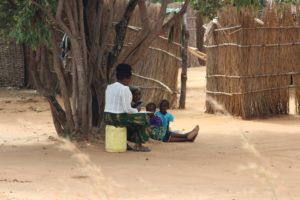
Alternative and Improved Livelihoods
Economically and socially viable alternative and improved livelihoods for communities living on the edges of the Nyika National Park and Vwaza Game Reserve that will lead to a reduction in poaching levels for both flora and fauna will be part of any balanced conservation research programme. Alternative and improved livelihoods should reduce poverty levels, increase food security and improve land use practices, as well as increase marketing and sales of wild products from on-farm or community, rather than protected area, lands. Such studies, demonstrations, and related extension activities should lead to a change in the mind-set amongst poaching communities, and provide valid economic alternatives. This topic is elaborated more in the Conservation Research Note 6 Human-Wildlife impact
Base Line Surveys
Base line surveys are an essential component in developing and monitoring conservation management programmes.
Completed Research Projects funded by NVT
- Report on the ecological status and abundance of African Cherry Prunus africana in Nyika National Park, and Malawi and Nyika National Park, Zambia 2021 Author: Paston Simkoko et al
- Microinvertebrate Aquatic assemblagies in Nyika National Park and Vwaza Game Reserve 2022_(January 2022 revised April 2022) Author: Harold Sungani et al
- Conservation Status of Juniperus procera on Nyika – Apr 2022 Author: Andrew Kanzunguze
Vwaza Marsh
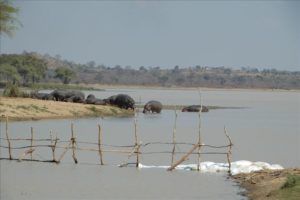 This area has been far less studied than the Nyika. Although it supports a range of wildlife, many are there only during the dry season. Determination of the key resources driving this, especially water supplies, are required. Further baseline studies are also needed. See the Conservation Research Note 5 ‒ Biodiversity in Vwaza
This area has been far less studied than the Nyika. Although it supports a range of wildlife, many are there only during the dry season. Determination of the key resources driving this, especially water supplies, are required. Further baseline studies are also needed. See the Conservation Research Note 5 ‒ Biodiversity in Vwaza
Completed Research Projects funded by NVT
- Vascular Plant Survey of Vwaza Marsh Wildlife Reserve Author: Sopani Sichinga
- Status and Condition of Stands of Colophospermum mopane (mopane) in Vwaza Marsh Wildlife Reserve, Malawi August 2021 Author: Sopani Sichinga
- Assessing Spatial Distribution, Abundance and Vegetation Structure of Lantana camara in Vwaza Marsh Game Reserve Author: Eric Gowero
- Using elephant pathways and dung to investigate human-wildlife conflict around Vwaza Marsh Wildlife Reserve Authors: Olivia Sievert, Pilirani Sankhani and Benni Hintz
- Butterflies of Vwaza Marsh Game Reserve, December 2023 VWBT Author Beston Kambeta

